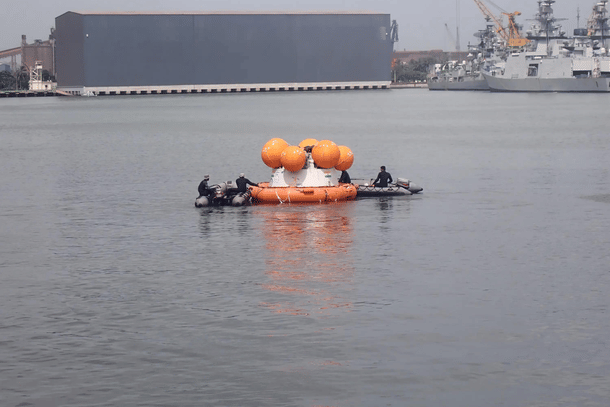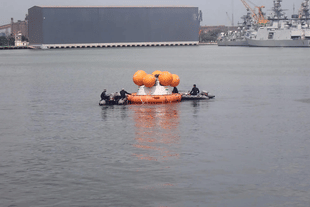News Headlines
Gaganyaan Mission: Recovery Trial Operations Enter Second Phase With Harbour Trials
Swarajya News Staff
Jul 23, 2023, 04:22 PM | Updated 04:22 PM IST
Save & read from anywhere!
Bookmark stories for easy access on any device or the Swarajya app.


The Indian Space Research Organisation (ISRO) is now in the second phase of the Gaganyaan mission's crew module recovery trial operations.
On Thursday (20 July), harbour trials were conducted at the Naval Dockyard in Visakhapatnam jointly by ISRO and the Indian Navy.
According to a statement from the Indian space agency, "The trials were conducted at the Eastern Naval Command in Visakhapatnam, using a mass and shape simulated Crew Module Mockup (CMRM). This mockup was a crucial component in the testing process, ensuring that the recovery procedures accurately simulated conditions."
Gaganyaan is an ambitious project by India to demonstrate its human spaceflight capability. The mission aims to launch a three-member crew into a 400 km orbit for a three-day mission and safely return them to Earth, with a landing in the Indian sea waters.
In the recent trials, various recovery stages were simulated, including the attachment of the recovery buoy, towing, handling, and lifting of the crew module on to the ship deck.
ISRO stated that these procedures followed the recovery sequence and demonstrated the preparedness of the teams involved.
ISRO has announced that it has fine-tuned its standard operating procedures (SOPs) for the recovery process of the Gaganyaan mission. This was done based on the experiences gained from phase-1 trials at the Water Survival Training Facility (WSTF) in Kochi. The aim is to ensure a seamless and safe recovery process for the mission.
The space agency achieved another milestone on Wednesday (19 July) with the successful testing of the Gaganyaan Service Module Propulsion System (SMPS) at IPRC, Mahendragiri.
The test involved the use of five liquid apogee motor (LAM) engines and 16 reaction control system (RCS) thrusters. These engines and thrusters will provide the necessary thrust for various orbital manoeuvres and abort scenarios during the ascent phase of the mission.
The Gaganyaan mission consists of three missions. The first mission will be without a crew, followed by a mission carrying a robot on board, and finally, the crewed mission. It is expected that the mission will commence by the end of 2024.
With the successful launch of the Chandrayaan-3 mission, attention is now focused on the upcoming soft landing attempt scheduled for 23 August.
The lunar exploration mission will not only provide valuable insights for future lunar missions but also contribute to the preparations for the Gaganyaan mission.





